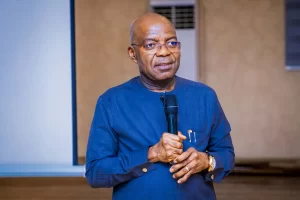As world leaders gather in Egypt to once again seek solutions to climate change challenges, EDIDIONG IKPOTO writes on the imperativeness of addressing the delivery of the $100bn climate fund promised to developing economies by developed countries in one the previous conferences
On Sunday, November 6, 2022, world leaders, for the 27th time, gathered in Sharm El-Sheikh, Egypt, to proffer solutions to climate change challenges.
While conversations surrounding climate change in 2022 have been somewhat pushed to the backstage due to more pressing global concerns such as the Russia-Ukraine war and economic downturn, this year’s edition of the climate event still holds a great deal of significance, particularly in the light of recent climate-related events around the world.
This year, the worst drought in 500 years was experienced in Europe. In the US, it was the worst in a thousand years, while China recorded its worst in history.
Elsewhere, a third of Pakistan is under water, while Nigeria recorded its worst flood in decades.
In the light of these stark realities, the cascading risks are very clear, according to the United Kingdom’s representative at the Cop 27, Alok Sharma.
So, this year’s conference is expected to be about concrete actions as the pressure on migration due to climate crisis becomes almost unimaginable.
Indeed, a cursory examination of recent climate-related global tragedies would indicate that humanity is still a far cry from achieving its goal of 1.5 degree temperature, despite this annual event geared towards ensuring this target.
But what exactly is the source of this paradox? Why has this target remained elusive despite numerous deliberations on the need to embrace renewable energy and phase out carbon emissions by 2050?
Thirteen years ago, at a United Nations climate summit in Copenhagen, Denmark, some wealthy nations made a significant pledge. Their promise was to channel $100bn a year to developing nations, by 2020, to help them adapt to climate change and mitigate further rises in temperature.
However, 13 years down the line, this promise has never been fulfilled.
According to data sourced from the Organisation for Economic Co-operation and Development (OECD), an intergovernmental body made up mostly of rich countries, wealthy nations contributed $80bn in climate finance to developing countries in 2019. This was the highest contribution to climate finance ever since the pledge was made.
The data also indicated that in 2013, about $53bn contribution was made. This represented a 47 per cent shortfall from the overall target. In 2014, $62bn was realised, and this once again missed the mark. The 2015 witnessed the worst default rate, as wealthy nations contributed only about $45bn to climate finance, missing the mark by more than 50 per cent.
The OECD said most of the funds came from public grants or loans, transferred either from one country to another directly, or through funds from multilateral development banks (MDBs).
A fraction is said to come from private finance that the public funds are said to have mobilised, such as loan guarantees and loans given alongside public funds.
But notwithstanding the fact that the OECD’s figures are a far cry from expectations, some analysts have faulted the figures, describing them as inflated.
In a 2020 report, the international-aid charity organization, Oxfam, estimated public climate financing at only $19bn–$22.5bn in 2017–18, which is one-third of the OECD’s estimate.
Oxfam’s argument was based on the fact that, besides grants, only the benefit accrued from lending at below-market rates should be counted, not the full value of loans.
Indeed, quite a number of low- and middle-income countries have sided with Oxfam. In 2015, India’s ministry of finance contested the OECD’s estimate of $62bn of climate finance in 2014. According to them, the figure realised was only $1bn.
Antigua and Barbuda’s climate-change ambassador and a former lead climate negotiator for a group of low-lying coastal and island nations, Diann Black-Layne, called the Alliance of Small Island States and accused wealthy nations of deliberately inflating their climate aid.
With climate change implicated in many natural disasters experienced this year, it goes without saying that the time for deliberation is over, and the big players must step up to the plate to save the planet from imminent disaster.
Speaking on the imperativeness of urgent action, the United Nations Secretary-General, António Guterres, on Monday, said that the global climate crisis had degenerated to alarming levels and now required urgent response to save humanity from imminent doom.
Guterres, who was addressing the conference during his opening speech on Monday, said that the world was now on “a highway to climate hell with our foot on the accelerator.”
“The clock is ticking. We are in the fight of our lives. And we are losing,” Guterres said as he addressed world leaders at the 2022 United Nations Climate Conference (COP27).
He warned that with greenhouse gas emissions growing and global temperatures rising, “our planet is fast approaching tipping points that will make climate chaos irreversible.”
The UN Chief, who warned that emissions were at an all-time high and rising, said the world could not afford any more delays.
He said the collective commitments of G20 governments were coming far too little and far too late, and that the actions of the wealthiest developed and emerging economies simply didn’t add up.
He said, “Taken together, current pledges and policies are shutting the door on our chance to limit global temperature rise to two degrees Celsius, let alone meet the 1.5-degree goal.
“We are in a life-or-death struggle for our own safety today and our survival tomorrow. There is no time for pointing fingers — or twiddling thumbs. It is time for a game-changing, quantum level compromise between developed and emerging economies.”
According to him, every government, every business, every investor or institution must step up the concrete climate actions for net zero, as failure to act on loss and damage would lead to more loss of trust and more climate damage.
On finance, he noted that the world needed clarity from developed countries on where they were this year on the delivery of their $100bn a year promise to support climate action in developing countries.
“We need to see evidence of how they will double adaptation finance to at least $40 billion dollars in 2025, as agreed in Glasgow. Funding for adaptation and resilience must represent at least half of all climate finance. And the Multilateral Development Banks – including the World Bank — must raise their game,” Guterres added.
COP27 President, Sameh Shoukry, while addressing the gathering, enjoined delegates to double down on the implementation of the promises already made.
Shoukry added the $100bn promised for adaptation by developed countries to developing countries should be delivered, just as finance must be at the front burner of the conference.
“The negotiations [during the next two weeks] will hopefully be fruitful. I urge all of you to listen carefully and commit to implementation and to turn political commitments into agreements and understandings and texts and resolutions that we can all implement,” he said.
Warning that “zero-sum games will have no winners,” Shoukry noted that the outcome of the conference would affect the lives and livelihoods of millions of people around the world suffering the impact of climate change.
“We cannot afford any negligence or shortcomings; we cannot threaten the future of upcoming generations,” he added.
In the same vein, the President of the African Development Bank, Akinwumi Adesina, while speaking on the sidelines of the Africa Investment Forum earlier this week, had said that it was time for the world to “walk the talk.”
Adesina added that the idea of achieving global climate expectations would continue to remain a mirage unless the richer nations make tangible contributions to helping the continent adapt to the devastating effects of climate change.
He said, “In Africa, our own challenge is how to adapt to climate change, but the money to do that is really not there. Africa will need between now and 2030, at least $125bn a year just to adapt to climate change. But how much does Africa get? Africa gets about $13bn.
“At the African Development Bank, we committed that we are going to put in 30 per cent of our financing to climate. Today we are at 41 per cent of our financing.
“My message going into COP 27 is, we don’t need megawatts of talk, megawatts of talk that lead to zero financing, that’s not what I am talking about. We need to have a sense of urgency and realise that Africa is suffering, realise that Africa’s growth is being stunted by what Africa did not cause. So, what are my expectations as we go to COP? Walk the talk.”
As Alok Sharma, the UK’s representative at the COP 27 succinctly put it, “We have reached a point where finance makes or breaks the programme of work that we have ahead of us.”
Sharma, who said some progress had been made on the $100 billion climate finance, agreed that more must be done by governments and by the multilateral development banks.
Quote: In Africa, our own challenge is how to adapt to climate change, but the money to do that is really not there. Africa will need between now and 2030, at least $125bn a year just to adapt to climate change. But how much does Africa get?























Add Comment